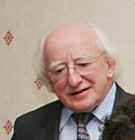
Image via Wikipedia
The following article was written for the Belfast Telegraph. Not sure if it was published.
Northern Ireland doesn’t have much of a commercial sector. But one of its biggest industries must surely be ‘the past’. No people in the developed world talks quite so much about former glories, and former shame.
On the glory front we used to have a great footballer who became one of the game’s most famous womanisers and alcoholics. We named an airport after him. We used to build big ships, and the ugly cranes that built them have become symbols of our industrial legacy. On the shame front we mounted a public enquiry into the killings of innocent people in Derry in the earliest days of our civil unrest – and the enquiry made millionaires of many lawyers and took twelve years to reach a conclusion.
Where, just about everywhere else, the natural tendency is to move on and learn from experience there is a tendency, here, to create vast public obelisks dedicated to the past. Per capita, we must have one of the most complex sets of quangos it is possible to have in a democracy. The so-called cuts have yet to make any material dent in our tendency towards over-engineering our civil society with the pedants of quango-land.
There is a place for institutions to look at the past. Indeed, the entire legal system has been created to seek resolution to events that took place in the recent or not so recent past. But public enquiries are something else again – and quite why they are demanded so much is a mystery to me. If the purpose of a judicial process is to reach a quick and just solution, public enquiries must be one of the worst means of achieving such an objective.
The Conservative Party published figures that suggest that the Bloody Sunday Inquiry cost everyone in the UK £6.64. The total cost of £400 million would have paid for a year’s salary for more than 15,000 nurses, nearly 5,000 doctors and 11,000 policemen, or 13 extra Apache helicopters for British forces in Iraq and Afghanistan. And I’d suspect that is a key reason why Owen Paterson and David Cameron have been so reluctant to agree to a public inquiry relating to the Pat Finucane murder. Is the sledge-hammer to be justified just because this is Northern Ireland and this is how we tend to crack nuts? No.
But there’s another point to be made. The entire “peace process” industry should not be our biggest industry. It tends to stifle everything else. This is not to detract from the grief of families that were made to suffer in Northern Ireland’s troubles. But at some point we have to move on as a Society – and as a Society we have to say “enough is enough”.
Unfortunately many of our politicians don’t agree. Sinn Fein’s tendency to add layer upon layer of complexity to our institutions of “post conflict resolution” is designed to ensure that we never arrive at a position where we’re post-conflict. Instead, it would appear, we have to reside in the perpetual motion machine of recriminations and blame. And the Unionist parties’ tendency towards tit-for-tat response to every Shinner demand oils the cogs of the never-ending vitriol machine. It must cause us to question whether they, collectively, have our best interests at heart.
Unfortunately our political class reflects back at us at every opportunity the shame of our past and its ability to keep tugging us back to the same old, nasty conversations that are, ultimately, divisive and damaging.
There is another way and it’s a way that is being taken by most people who live and work here and try to retain the correct perspective on life and living. Because most in our society choose to shut themselves off from the peace processing discourse. Most get on with their jobs and their life isolated from the never-land conversations that never reach a resolution.
As a people most of us yearn for a political class to emerge that reflects our real, innate need for empathy with our real, everyday situations. And that would require political understanding that has very little to do with the past and everything to do with the present.











Recent Comments